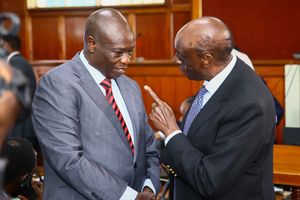Paul Kagame: I’d give bullets for the gender equality cause

Rwanda's President Paul Kagame. He says he supports the push for gender equality.
What you need to know:
- Rwanda's president tells journalist that women’s liberation is justified and deserves full support.
- He says women have been 'denied education, business opportunities, and the ability to speak in public, yet men never raised an eyelid'.
Paul Kagame’s immensely analytical personality emerged 43 years ago when, as a young Batutsi refugee living in Uganda, he was part of a battle-hardened combat intelligence unit.
He loathes dishonesty, is humble and driven by a permanent sense of urgency and vigilance. The Rwandan president sleeps five hours a night, works 15 hours a day and persistently devours economic treatises and their implementation.
He is a teetotaller and a non-smoker. He hates losing a tennis match, is indomitably resilient, and is the force for Rwanda's incredible economic transformation. Along with Germany and Japan, Rwanda embodies the success of post-conflict reconstruction.
As a child in 1959, Kagame's family was exiled and took refuge in Uganda. In 1978, he was sent to Tanzania by Uganda's National Resistance Army (NRA) for eight months to train in military intelligence.
He joined Yoweri Museveni and the NRA in the battlefield in February 1981, leading to the NRA victory in overthrowing the Ugandan government in January 1986 with 20 per cent of its troops consisting of Rwandans.
Shortly after, he travelled to Havana, Cuba, for nine months to take more classes on military intelligence, in Spanish.
In 1987 when he returned to Kampala, he created the party he would use to lead his nation, The Rwandan Patriotic Front (RPF). While on an optical visit to Nairobi in 1989, he was invited for a glass of milk by Jeannette Nyiramogi.
A glass of milk is considered precious by the Batutsis. Jeannette broke through his shyness and he married her in the same year.
In May, both Kagame and Jeannette were sent by the RPF to the US Army Command Centre, Fort Leavenworth in Kansas, the oldest US Army post west of the Mississippi River, for special military training. He returned to Rwanda after the chief commanding officer of RPF, Fred Rwigyema, died.
On July 4, 1994, Kagame, then aged 36, was the commander of the RPF army that ended the Rwandan genocide. The first RPF patrol entered Kigali from their base and his hometown of Tambwe in the Southern province.
The RPF took over a country that had been shattered morally, politically and economically, by the genocide.

The cover of Kagame: Conversations with the President of Rwanda, a book by Francois Soudan, a journalist of the French Jeune Afrique magazine.
There was no government and Kagame had the power to name himself president but didn't. Instead, he chose to serve as vice president and minister for defence under President Pasteur Bizimungu.
He was inaugurated as President of Rwanda on April 22, 2000, after Bizimungu resigned in March 2000, and the Supreme Court ratified that Kagame assume the presidency ahead of elections.
Twenty-three years later, the figures attesting to the extent of the Rwandan success story are staggering. Life expectancy rose from 45 to 65 years, and the infant mortality rate dropped by 70 per cent. Per capita income increased by 60 per cent and over a million Rwandans were lifted out of extreme poverty.
More than 90 per cent of children under the age of 12 attended school. The economy consistently grew by over 7.0 per cent annually, with Rwanda ranked second behind Mauritius among African nations with the most favourable conditions to transact business.
In 20 years, the population growth rate has decreased from 10 per cent per annum to less than 3.0 per cent. With contraceptive use increasing from 17 to 53 per cent from 2005 to 2015, and unlike most African leaders, Kagame has refused to endow his relatives with political favours and wealth.
Rwanda has become the world's leading country in women representation in parliament, 64 per cent of elected officials are women. Half the judges serving in the Supreme Court are also women, as are nine out of 21 ministers. This extraordinary result is the fruit of laws and quotas imposed by Kagame.
When asked about embracing equality and the exceptional progress of women by Francois Soudan, a journalist of the French Jeune Afrique magazine and the author of Kagame: Conversations with the President of Rwanda, Kagame speaks passionately, stating that because women make up 52 per cent of the Rwandan population, it's entirely natural that every citizen counts.
“We are building a country; therefore, we can’t possibly ignore 52 per cent of the population!"
He says everyone should be part of reconstruction and strongly believes in women's rights and the significance of their prosperity in society.
“Frankly, if I were a woman, I would have waged a war a long time ago to liberate women, as I did to liberate my country," he says. "If oppressed women should wage a war, I would readily smuggle ammunition to them, for it would be a justified war.”
Asked about many Rwandan men complaining about women's progress, feeling they are dominated by women and that Rwanda has become a matriarchy, Kagame unapologetically says: “They should keep that to themselves. In the past, women have been denied education, business opportunities, and the ability to speak in public, yet men never raised an eyelid.”
The reviewer is a novelist, a Big Brother Africa 2 Kenyan representative and founder of Jeff's Fitness Centre (@jeffbigbrother)





